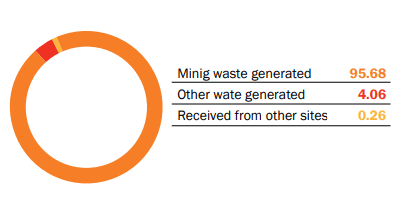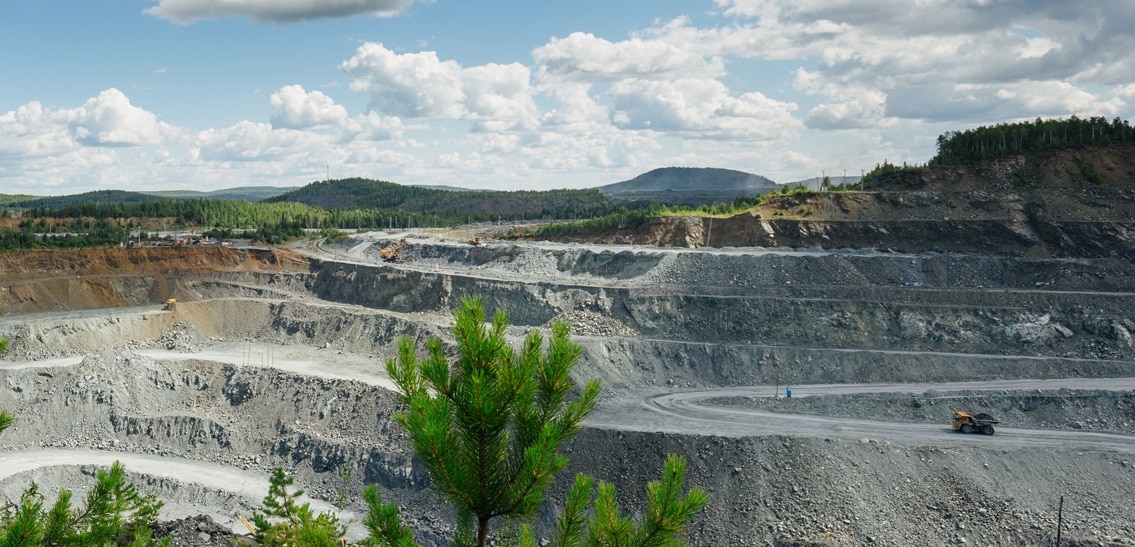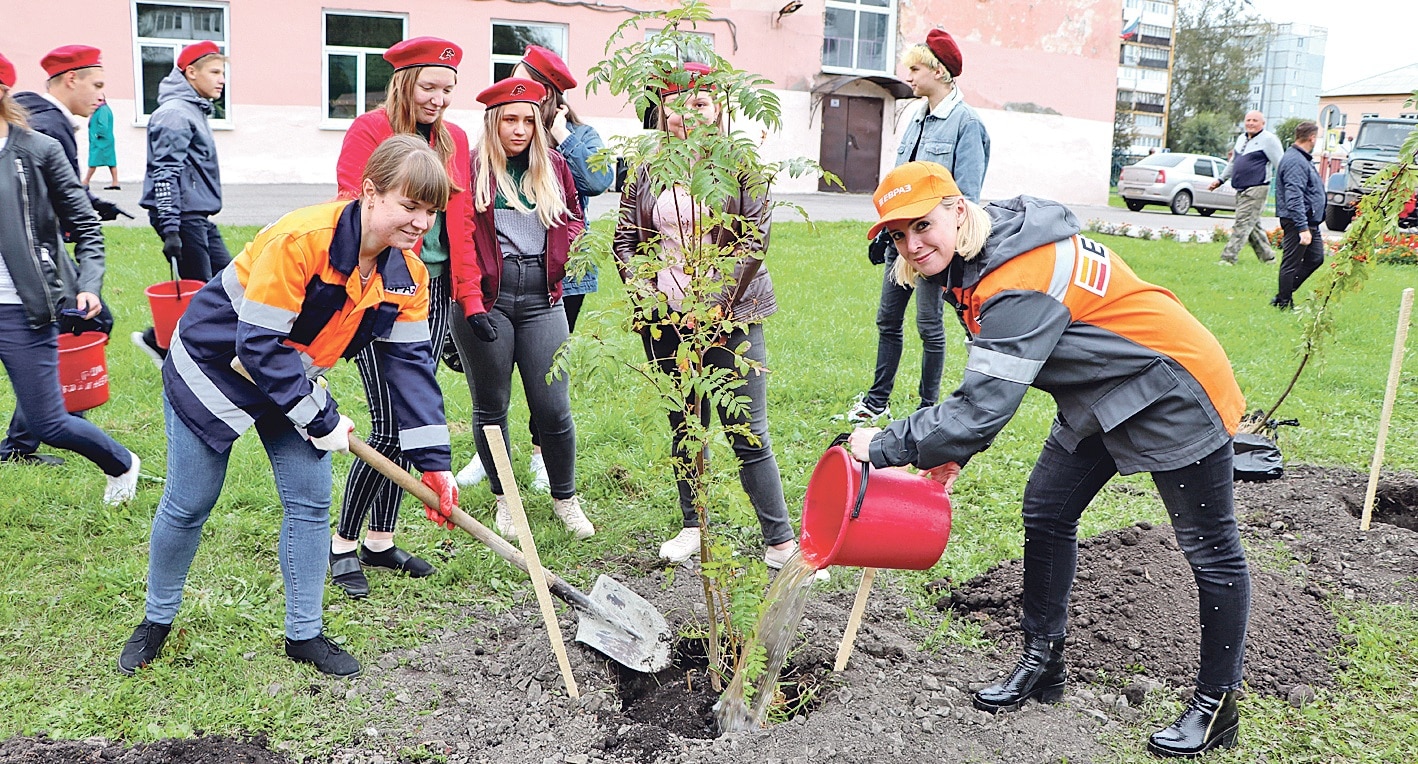Waste stewardship
During mining and steel-making operations EVRAZ generates significant waste, such as barren rock, spent ore, and tailings, which are a by-product of processing ore and concentrates. Our aim is to reduce the volume of waste we produce and to manage it in an efficient way. Our waste management activities correspond to key industry trends:
- Minimising waste generation at source by improving technological processes
- Increasing the share of reused and recycled waste
- Safe disposal or incineration at special facilities
Under no circumstances do we incinerate or store waste outside special facilities, in line with applicable legislation and EVRAZ Fundamental Environmental Requirements. We actively promote separate waste collection systems at our enterprises, in order to facilitate its further recycling.
Total non-mining waste and by-products generated by EVRAZ enterprises stood at 8.45 million tonnes in 2019.
GRI 306-2

The Group strives to reclaim or reuse waste for various purposes. In 2019, 84.35 million tonnes of waste (including mining waste) was reused. The Group uses non-hazardous mining waste for the purposes of land rehabilitation and to build dams and roads, where possible. In 2019, 75.5 million tonnes of this waste were reused, which corresponds to 38% of total waste.
Under our established five-year environmental goal, we are required to recycle 95% of non-mining waste and by-products each year. In 2019, this rate stood at 105.2%, due to the recycling of previously disposed of metallurgical slag and materials.

Project: Non-recyclable waste handling.
Stakeholders: local communities.
For non-recyclable waste such as tailings, EVRAZ creates facilities that provide reliable long-term storage. In 2019, the Group had three tailings storage facilities (TSF) in operation with upstream dams owned by EVRAZ ZSMK and EVRAZ KGOK.
To ensure the security of TSF, EVRAZ has a dam safety management system in place that complies with all relevant legislative requirements. The system covers all stages of a dam life cycle: design, construction, operation, and closure, and is subject to close safety and environmental monitoring. TSF processes and procedures are regularly examined by EVRAZ operational units and audited by HSE personnel at sites, inspectors from regulatory bodies, and EVRAZ’s internal industrial safety auditors. All dams have safety zones where no residences or civilian infrastructure are allowed, and EVRAZ focuses on trying to mitigate any danger as far as possible.
In October 2019, in response to a request from the Church of England Pensions Board, EVRAZ released a report with detailed information on Tailings Storage Facilities, in order to provide transparency and build greater trust with stakeholders.
The report, as well as other information relating to TSF, is in the public domain and can be accessed by all stakeholders on our official website.
Value for stakeholders: clean and safe environment.
Value for EVRAZ: public trust, enhanced reputation, safe operations.

GRI 304-1
Protecting biodiversity
Protecting biodiversity is an essential aspect of global sustainability. Mining and steel-producing companies can have a number of impacts on biodiversity. Although EVRAZ enterprises are situated far from protected natural areas or territories with high biodiversity value, and the activities of the Group have no direct significant impacts on biodiversity, we still consider biodiversity as a significant challenge requiring action to be taken. We aspire to cultivating a culture where a proper attitude is fostered towards nature and biodiversity among our employees, and establishing effective communication channels with local communities. We place a special emphasis on encouraging local initiatives from our enterprises.
We are engaged in biodiversity preservation activities in the following areas:
- The rehabilitation of disturbed land and landscaping activities
- The restoration of aquatic biodiversity
- Socio-ecological campaigns managed jointly by municipal administrations
Rehabilitating disturbed land and landscaping
EVRAZ is committed to implementing environmental projects in order to compensate for its mining and steel-making operations.
GRI 304-3
In 2019, the following results were achieved:
- At Evrazruda (EVRAZ ZSMK), over 64,000 of sea buckthorn and pines were planted as part of a reclamation project for tailings storage facility No. 2
- The reclamation of disturbed land at Block No. 3 of Raspadskaya (mining stage) continued: 2,114 thousand tonnes of rock were reclaimed
Restoring aquatic biodiversity
Ensuring the quality of water ecosystems and providing suitable habitats for various species form an integral part of EVRAZ’s biodiversity preservation actions. We regularly, with preliminary scientific studies, release various species of fish into water bodies to support and enrich existing biodiversity. In 2019, EVRAZ enterprisesThe figure comprises data on EVRAZ ZSMK (incl. Evrazruda), EVRAZ NTMK, and Raspadskaya Coal Company (Novokuznetsk and Mezhdurechensk sites). released over 379,000 fingerlings.
EVRAZ NTMK runs a comprehensive rehabilitation programme for water bodies, which includes treatments using chlorella, and the introduction of air-aquatic plants pistia and eichhoria and herbivorous types of fish.
Project: Enriching aquatic fauna
Stakeholders: local communities
EVRAZ NTMK continues to implement measures as part of a rehabilitation programme for water bodies: the federal body Gosrybtsentr has conducted research and recommended several breeds that will consume harmful algae and prevent reservoirs, ponds, and rivers near Nizhny Tagil from overgrowing.
In 2019, the plant’s environmental specialists released into the Lenevsky Reservoir and Nizhny Tagil pond 5,000 grass carp fingerlings and 32,000 silver carp fingerlings.
Silver carp helps keep water bodies clean by filtering flower-filled, green, and muddy water. They can also be fished, as they can grow up to 100 centimetres in length.
Value for stakeholders: clean water bodies.
Value for EVRAZ: public trust, enhanced reputation.

Socio-ecological campaigns
EVRAZ enterprises continue to organise joint environmental and social campaigns with municipalities, inviting volunteers that are eager to contribute to improving the environment. Such events are aimed at uniting EVRAZ employees and members of the local community that care about the environment.
As part of our environmental campaigns in 2019, 920 trees were planted in parks and squares. One of the liveliest events was “The Second Life to Trees” initiative, during which young trees are transplanted into city parks from sites where mining operations will take place.
Other events include:
- Environmental clean-ups
- The “Clean Games” eco-quest
- The Clean Shores for the Rivers campaign
- The Save the Spring campaign
In 2019, EVRAZ continued to support its employees in their aspirations to organise environmental events, which include voluntary clean-ups, tree planting, and building and setting up birdhouses to enhance the environment. During the reporting period environmental experts from Raspadskaya Coal Company (Mezhdurechensk site) also ran environmental courses at educational institutions.
These activities were often conducted in cooperation with local communities – administrations, schools, and kindergartens – in order to raise awareness surrounding environmental issues, with an emphasis on specially protected natural zones.
Case study
If inserted into the soil, one battery can pollute around 20 m2 of the surrounding ground with heavy metals. This can affect trees, moles, hedgehogs, and thousands of earthworms at just one site. In 2019, COF Abashevskaya employees for the first time organised a campaign to collect batteries, inspired by colleagues at the Mezhdurechensk site. The collected batteries were handed over for recycling. The campaign is still being run at the factory.

